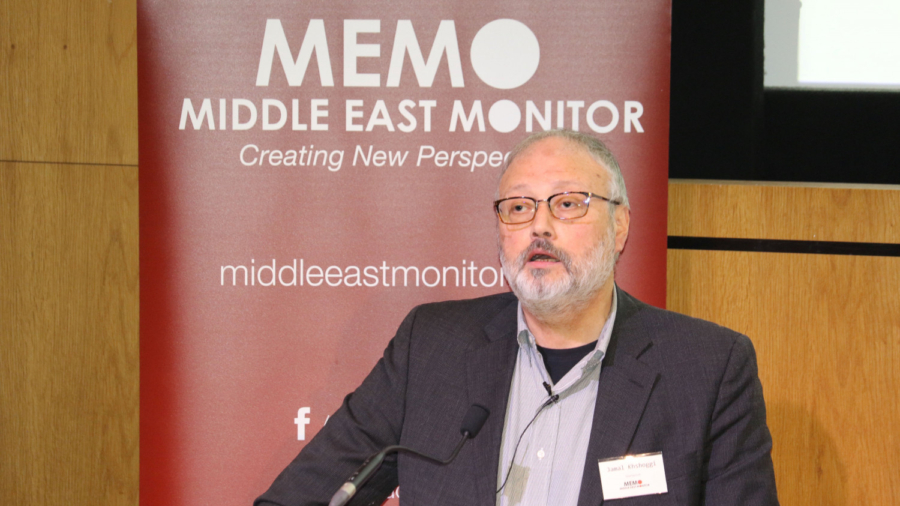WASHINGTON—Saudi Crown Prince Mohammed bin Salman approved of an operation to capture or kill dissident journalist Jamal Khashoggi, who was murdered in 2018, according to a declassified intelligence assessment released on Friday in a manner choreographed to limit damage to U.S.-Saudi ties
Khashoggi, a U.S. resident who wrote opinion columns for the Washington Post critical of the crown prince’s policies, was killed and dismembered by a team of operatives linked to the crown prince in the kingdom’s consulate in Istanbul.
Riyadh has denied any involvement by the crown prince, Saudi Arabia’s de facto ruler.
“We assess that Saudi Arabia’s Crown Prince Muhammad bin Salman approved an operation in Istanbul, Turkey to capture or kill Saudi journalist Jamal Khashoggi,” the U.S. Office of the Director of National Intelligence said in the report.
The intelligence agency based its assessment on the crown price’s control of decision-making, the direct involvement of one of his key advisers and his own protective detail, and his “support for using violent measures to silence dissidents abroad, including Khashoggi,” it added.
“Since 2017, the Crown Prince has had absolute control of the Kingdom’s security and intelligence organizations, making it highly unlikely that Saudi officials would have carried out an operation of this nature without the Crown Prince’s authorization,” the report said.
In declassifying the report, President Joe Biden reversed his predecessor Donald Trump’s refusal to release it in defiance of a 2019 law, reflecting a new U.S. willingness to challenge the kingdom on issues from human rights to the war in Yemen.
However, Biden is treading a fine line to preserve ties with the kingdom as he seeks to revive the 2015 nuclear deal with its regional rival Iran and to address other challenges including fighting Islamist extremism and advancing Arab-Israeli ties.
Washington choreographed events to soften the blow, with Biden on Thursday speaking with the crown prince’s 85-year-old father, King Salman, in a call in which both sides said they reaffirmed their decades-old alliance and pledged cooperation.
The Biden administration will announce sanctions and visa bans on Friday targeting Saudi Arabian citizens over the Khashoggi killing, although it will not impose sanctions on the crown prince, U.S. officials said.
As it reassesses relations with one of its closest Arab allies, the United States is also considering the cancellation of arms deals with Saudi Arabia that pose human rights concerns while limiting future military sales to “defensive” weapons, sources familiar with the administration’s thinking said.
A State Department spokesperson said the U.S. focus was on ending the conflict in Yemen even as it ensures Saudi Arabia has everything it needs to defend its territory.
The declassified intelligence echoed a classified version of a report on Khashoggi’s murder that Trump shared with members of Congress in late 2018.
Trump’s rejection of demands by lawmakers and human rights groups to release a declassified version at the time reflected a desire to preserve cooperation with Riyadh amid rising tensions with Iran and to promote U.S. arms sales to the kingdom.
Biden’s new director of national intelligence, Avril Haines, has committed to complying with a 2019 bill that required her office to release a declassified report on Khashoggi’s murder.
Khashoggi, 59, was a Saudi journalist living in self-imposed exile in Virginia who wrote opinion pieces for the Washington Post critical of the policies of the crown prince–known to some in the West as MbS.
He was lured on Oct. 2, 2018, to the Saudi consulate in Istanbul with a promise of a document that he needed to marry his Turkish fiancee. A team of operatives linked to MbS killed him there and dismembered his body. His remains have not been found.
Riyadh initially issued conflicting stories about his disappearance, but eventually admitted that Khashoggi was killed in what it called a “rogue” extradition operation gone wrong.
Twenty-one men were arrested in the killing and five senior officials, including the deputy intelligence chief, Ahmed al-Asiri, and Saud al-Qahtani, a senior MbS aide, were sacked.
In January 2019, 11 people were put on trial behind closed doors. Five were given death sentences, which were commuted to 20 years in prison after they were forgiven by Khashoggi’s family, while three others were given jail terms.
Asiri was tried but acquitted “due to insufficient evidence,” the prosecution said, while Qahtani was investigated but not charged.
As part of Biden’s rebalancing of ties with Saudi Arabia, he will only communicate with King Salman, the White House has said, a move that may allow Washington to put some distance between itself and the crown prince, aged 35.
That will restore protocol broken by Trump and his son-in-law and top aide, Jared Kushner, who maintained a direct channel to the crown prince.
MbS has consolidated power since ousting his uncle as heir to the throne in a 2017 palace coup, seeking to win public support by overseeing popular economic and social reforms.
But he also has had opponents and women’s rights activists detained and pursued risky foreign gambits, some of which backfired, like the intervention in Yemen, where a war between Saudi and Iranian proxies has created a humanitarian crisis.
By Jonathan Landay

